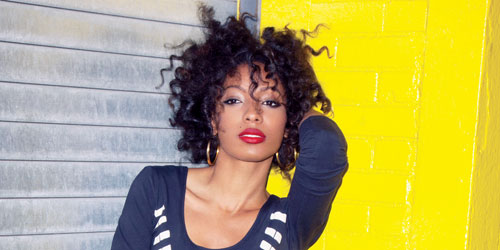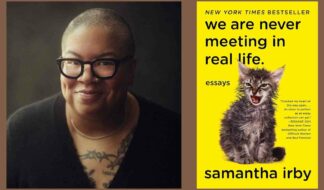
Of course Wynter Gordon is named after Diana Ross, at least before the "Dirty Talk" singer changed it so she didn't have to explain that she wasn't that Diana. But she still has something in common with the Supremes legend – lots of gay fans.
Not only did she just release an EP, "With the Music I Die," but Gordon's also written a handful of songs for other artists, including Mary J. Blige, David Guetta and Jennifer Lopez, whom she wrote a post-breakup song for before the actress' recent split with Marc Anthony. Currently, Gordon's continuing work on her full-length debut, which she says is due later this year or early next, depending on the success of the singles – and so far, so good: "Til Death" recently made a Hot Shot Debut on the Billboard Club Play Chart.
The ethereal-voiced singer, who lives in New York, caught up with us during tour rehearsals to chat about the divas who influence her, growing up in a homophobic country and how she almost gave up music altogether.
What can we expect from your live set?
I'll be performing new songs from the album for the very first time. It's just going to be fun.
I haven't been able to stop listening to "Still Getting Younger," one of the songs on your EP. Tell me about the song.
That's my favorite song on the album. "Still Getting Younger" came about at a time in my life when I was feeling really discouraged about the music industry. But then I went to London and I met Nick Littlemore – the producer and co-writer of the song – and just being with him was so freeing. He just told me to forget all the rules and just make music that I love, and the song came about within minutes. I'd never really recorded a song like that. It was such a great experience and brought back my love for the project.
Why were you so unhappy with the music industry?
It's not that I wasn't happy with it, but I had spent a whole summer – the same summer I wrote "Dirty Talk" – in one room, within four walls, and I kept churning out music. I had over 100 songs, but they weren't getting any play. And I'd been in the music industry for such a long time, and I was like, "I'm kind of over it. I've been trying for a long time."
But I got the whole artist experience without actually being famous. I discovered what I like and what I don't like through trial and error, because working with Flo Rida on "Sugar," I got to travel the world with him. I experienced all the things that new artists experience, without anybody even knowing who I was.
It was kind of like a shield, because at that point in time, people were telling me how I should dress, what the videos should look like or what my sound should be – and through trial and error, I learned what I'm comfortable with and I wasn't afraid to show it.
When you were younger, you listened to big-voiced icons like Whitney, Mariah and Celine. How did they influence you musically?
I love the runs that Celine does and the way she opens up her voice. I always tried to emulate her as a little girl. And then Alanis Morissette, her melodies are so original. When I make music, I try to bring melodies into a song that nobody's really using or hearing, and that's what I took from her.
They all have a very distinctive way of moving their hands: Mariah has them in the air, Celine pounds her chest with them and Alanis does something with them that I can't really explain. What do you do with your hands when you're performing?
I guess I have a very violent stance. I'm super muscular, so my hands are always balled-up in a fist; it looks like I'm going to punch somebody, like I'm angry. (Laughs)
But you're not?
No, no. I'm happy. It just looks like I want to hurt someone.
Recently, the media was reporting that a song you wrote for Jennifer Lopez, "Starting Over," for her latest album had something to do with her ex, Marc Anthony. What's the deal with that? Did you write that knowing they'd split?
No! I'm actually surprised. I was as shocked as everybody else, because Marc was on set with her (during "The Back-up Plan") when I was there and they were very loving to each other. But at the same time, I had to sit down and talk to her and she explained that marriage is work and you can love somebody but you still have to work on marriage – living in the same house, seeing that person every day – so I kind of ran with it, but I didn't realize it would be a testament to the future.
What about some of the song lyrics, like when you refer to the guy as a "dog" and a "player"?
I kind of made that up. (Laughs) I really had no idea.
You were raised in South Jamaica, which is one of the most homophobic places on Earth.
Is it homophobic? You know, I left when I was 17, so I didn't see it. I didn't really know any gay people on the block. It wasn't like there was any homophobia around me, and nobody said anything anti-gay, because I don't think anybody really knew anybody gay. You know, it wasn't in to be out back then. It wasn't really accepted as it is today.
A very close family member just came out to me, and I don't want to reveal his name because he's young and he's still struggling with his choice, but he grew up with me, so I knew before he knew.
With music, how did you figure out you have a gay following?
I did a song called "Surveillance" and I got called to a club – Deko Lounge in New Jersey – by the DJ who said, "I want you to come out, we love your music." I got there and it was a gay club and everybody showed me so much love.
How did the song "Putting It Out There (Pride)," the Official Sydney Gay & Lesbian Mardi Gras '11, come about?
I didn't even write the song for that. I just put it out because I thought it would be perfect for it. Those words are really strong to me. Sometimes those songs work for everything in your life.
And the song was also used as part of the "It Gets Better" campaign the year before. Why did you feel a need to become involved in that?
Because of my very close family member, and not really understanding the issues until it's firsthand in your face. I had to deal with the problems and talk my family member through it – just to be OK with it and the religion thing, because we grew up very religious. He didn't think God loved him anymore, and I love him more than I love myself. It just gave a new understanding of what gay people go through.
Do you remember the response you got from that song?
Nobody personally wrote to me. It was more comments on YouTube and people would say, "I love that song" and "thank you for doing that." I always feel, because I've been asked to speak at a lot of events, it's better to speak through my music than having me just speak. It makes more of an impact.
So many artists have released empowering anthems lately, like Katy Perry and Lady Gaga. What do you think of how other artists have used their music as a platform for songs about acceptance and perseverance?
I think the more the merrier. As an artist you have that huge audience, so it's your responsibility to do something positive with it.
Patrick Stump with Wynter Gordon
Doors 7 p.m. Aug. 7 ($20)
The Magic Bag
22920 Woodward Ave., Ferndale
http://www.themagicbag.com











